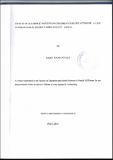Effects of alcoholic parents on children's behavior peer relationships: A case of Imenti North District: Meru county - Kenya

View/
Date
2012-07Author
Nyaga, Mary Wanja
Type
ThesisLanguage
enMetadata
Show full item recordAbstract
Research among families of typically-developing youth suggests that parents help their elementary school-age children make friends by networking with other parents to arrange social opportunities for their children, modelling positive interpersonal skills themselves, and coaching their children during peer interactions. Because play-dates (arranged play periods between two children outside of organized activities, usually at one child's home) are considered essential for close friendships to deepen, parents are particularly suited to help their child make friends. Parents' warmth towards their children, parents' own skilled social interaction with other adults,
and parents' facilitation of the child's peer interactions all were correlated with children being better accepted by peers Parental behaviors may encourage children's good peer relationships. Alcoholism parents therefore, may not provide the required support to their children to necessitate good peer relationships and may also be a major cause of family problems which may adversely affect children. Family problems can have damaging effects on children's• peer relations. For example, children of divorcing parents may act out feelings of anger at school, eliciting rejection from peers in the process. Children with family problems, such as parental alcoholism, may be reluctant to bring friends home, avoiding close friendships as a result. Due . to poor parenting and modelling from alcoholic parents, some children behave in an aggress~ or disruptive manner and, hence, are rejected by peers. Other children withdraw from peer interactions and, in this way, limit their ability to gain acceptance and friendship. The intention
of the researcher in this research was to evaluate the impact of parental alcoholism on children's peer relationship aged between 10-15 years in Miiriga Mieru East Division, Imenti North District, in Meru County. The study covered three out of the five slums within Meru Town. The significance of this study was to promote children's peer relationship particularly with the help
of their parents. The study limitations included unmet expectations by the slum environs which made the respondents hesitant to answer questionnaires. The study used ex post- facto and survey designs. The population was 388 children and 191 parents from which a sample size of 191 children and 73 parents was selected from the three slums i.e.( Shauri Yako, Mjini and Majengo ). Stratified random sampling and simple random sampling methods were used for. Self¬scoring questionnaires and oral interviews were used to collect data from the respondents. The researcher used computer based statistical packages for social sciences (SPSS) version 7.1 to analyze data. Tables with figures, graphs and charts were used to summarize the results. Analyzed data were interpreted, conclusions made and recommendations put forward in order to address the observed problems facing COAs in their peer relationships. The researcher after the research findings concluded that there are various ways through which children's peer relationships are affected by parental alcoholism. These effects hindered the socialization in peer groups between COAs and non- COAs which is an essential aspect in children's development.
The researcher also gave some recommendations with the focus of improving peer relationships among COAs and non-COAs for healthy developments. These recommendations include educating parents more on the effects of parental alcoholism on the children's relationship with peers, establishing counselling set ups in schools to help COAs, training non-COAs so that they
are able to accept COAs and value them among others.
Publisher
KeMU
